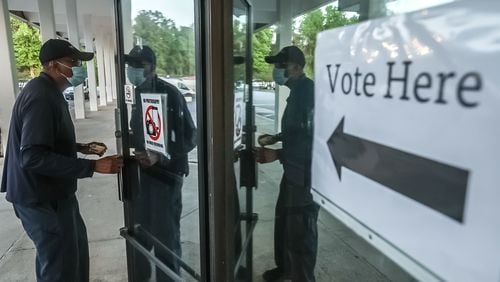Related
Georgia Legislation
Georgia's Republican-controlled state Legislature is once again taking aim at illegal immigration, this time amid a heated race for the GOP presidential nomination with frontrunner Donald Trump refocusing attention on U.S. border security.
In a year in which all 236 state lawmakers are facing re-election, Georgia’s Senate has approved measures to crack down on so-called “sanctuary cities” that don’t fully cooperate with federal immigration authorities and to place new restrictions on driver’s licenses issued to immigrants without legal status.
On Monday, the Senate passed a proposed state constitutional amendment that would declare English Georgia’s official language. And last week, the House advanced a bill that would bar immigrants without papers from serving on local commissions, councils and boards.
The flurry of activity — a few of the bills were introduced in past years — is drawing new attention because of Trump, who has used the immigration issue to ride to frontrunner status in the race for the Republican presidential nomination. The measures are dividing Georgia Republicans in both chambers — some have spoken out against the bills — and are drawing opposition from outside groups. Among them is the Fulton County Commission, which signaled its disapproval in a unanimous vote Tuesday against House Bill 781, the measure that would restrict who could serve on local boards.
Proponents, meanwhile, say the measures are necessary to drive out immigrants who are here illegally, protect Georgia’s taxpayer-funded resources, bolster public safety and prevent voter fraud.
Phil Kent, a member of Georgia’s Immigration Enforcement Review Board, called the bills “commonsense efforts designed to foster homeland security and uphold the rule of law as they relate to our presently unsecure borders and Georgia’s large undocumented population of immigrants.”
Opponents, meanwhile, say the measures are discriminatory, damaging to the state’s reputation and unnecessary. They point out state law already makes English Georgia’s official language. Further, the authors of the other bills have not been able to cite examples where immigrants without legal status have been appointed to local boards or carried out terrorist attacks or voter fraud in Georgia.
Republican state Rep. B.J. Pak of Lilburn, who voted against HB 781, dismissed the idea that “we are somehow coddling illegal immigrants” and called the bill “a solution to a problem that doesn’t exist.”
“In my mind,” Pak said, “I think we could be better focused on improving the laws that we have instead of passing new laws that really don’t do anything.”
The sponsor of HB 781 — Republican state Rep. Brad Raffensperger of Johns Creek — said he was inspired to act after a California city appointed two people without legal status to city panels. He didn’t identify the city. But Huntington Park — a small city located outside of Los Angeles — made news last year when it appointed two immigrants without papers to its parks and recreation and health and education commissions.
“I have heard of some organizations speaking out against this bill, which really amounts to them advocating that illegal immigrants should be allowed to sit as members of a government board, commission or authority,” Raffensperger said in an email. “I do not believe this viewpoint would be supported by the broad majority of American citizens.”
Critics also say such legislation comes right out of Trump's playbook. The billionaire real estate mogul has drawn international attention for proposing to deport all the estimated 11 million immigrants living illegally in the U.S. and to build a wall on the southwest border at Mexico's expense. Fellow GOP contenders Ted Cruz and Marco Rubio are also campaigning on beefing up border security as well as denying "amnesty" for immigrants who have entered the country illegally. In contrast, Democratic presidential hopefuls Hillary Clinton and Bernie Sanders have announced their support for creating a path to citizenship for them.
The Georgia Association of Latino Elected Officials issued a statement this week condemning Georgia’s immigration legislation and calling it “Trump-like.”
“It is a huge step back for Georgia and it creates a hostile environment for foreigners in our state,” said Jerry Gonzalez, the association’s executive director. “And, certainly, our economic development efforts will be harmed by this.”
Georgia last dived into the thorny debate over illegal immigration in a major way in 2011, when Republican Gov. Nathan Deal signed House Bill 87, a comprehensive law aimed at driving out immigrants living illegally in the state. Patterned after a stringent law passed in Arizona, Georgia's statute triggered threats of economic boycotts, years-long federal court battles and financial losses in the state's massive farming industry.
Tensions over the issue in Georgia were brought into sharp focus Monday, when state lawmakers debated Senate Bill 6, which would create special driver's licenses and ID cards that more clearly identify immigrants without legal status. The new cards would be issued to immigrants who have received temporary deportation deferrals and would carry the label: "No lawful status." The cards now issued to deferred action recipients say "limited-term."
The sponsor of SB6 — Republican Sen. Joshua McKoon of Columbus — said the measure would help protect the public.
“We have very little in the way of identity verification for people that are receiving these licenses and who have no lawful status,” McKoon calmly told the Senate moments before the vote. “So you can easily see a situation where someone who wants to do harm — who wants to, for example, pursue a terrorist act of some kind — using a limited-term Georgia driver’s license to access a secure government facility and then carrying out an attack.”
Under questioning from Democratic state Sen. Lester Jackson of Savannah, McKoon couldn’t identify any instances where people with deferred action committed acts of terrorism in Georgia. McKoon cited the Dec. 2 terrorist shooting massacre in San Bernardino, though one of the shooters was an American-born citizen of Pakistani descent and the other was a lawful permanent resident who came here on a fiancée visa.
Democrats and Republicans rose on the Senate floor to argue the measure would brand people with a “scarlet letter,” cost hundreds of thousands of dollars in taxpayer money to carry out and make it harder for immigrants without legal status to find work and contribute to Georgia’s economy.
“Think about it. Why are we doing this?” Republican state Sen. Tommie Williams of Lyons — his voice edged with frustration — told the Senate before voting against the bill. “We are doing this because there are those in the hall that do not like brown people. I wish that weren’t so.”
About the Author







